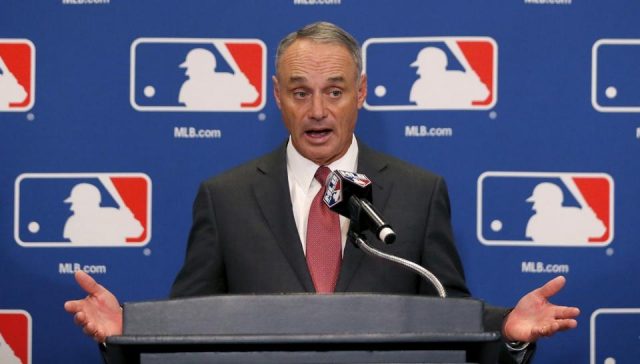
Baseball Commissioner Rob Manfred responds to a question Aug. 24, 2017 at the two-day meeting of Major League Baseball owners in Chicago. (AP Photo/Charles Rex Arbogast)
By Douglas J. Gladstone
VOD Guest Column
Published August 30, 2017
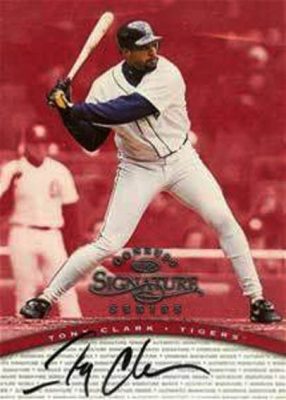
Tony Clark, Exec. Director MLBPA, during his days as a Detroit Tigers All-Star.
When he received the coveted Jackie Robinson Lifetime Achievement Award from the Negro Leagues Museum in Kansas City last June, Tony Clark, the former Detroit Tigers All-Star first baseman who is now the executive director of the Major League Baseball Players Association (MLBPA) – the first former player to ever hold that position, by the way — referenced a quote from the late Muhammad Ali.“Success is what you achieve,” said Clark. “Your significance is what you leave.”
That’s nice, isn’t it?
But talk is cheap. Just ask former Detroit pitchers Steve Grilli and Chuck Seelbach. Or retired second baseman Chuck Srivener, of Birmingham, Michigan. Or Carmen Fanzone, the versatile utility player for the Cubs and Red Sox who grew up in Detroit and went to Cass Technical High School and later Central Michigan.
Or Herb Washington, the former Michigan State track star who became the designate punch runner for the Oakland Athletics.
All are among the 500 retirees without (MLB) pensions.
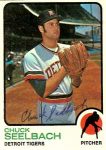

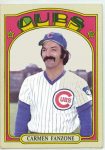
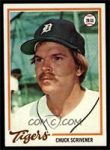
For the most part, baseball players nowadays are set for life. Vested retirees are able to earn as much as $210,000; even the minimum pension for someone who played after 1980 is a reported $34,000.
Except for guys like Fanzone, Grilli, Scrivener and Seelbach. They only get $625 for every quarter of service credit of 43 game days they accrued, up to 16 quarters or $10,000.
Unlike a real pension, the non-qualified retirement benefit the pre-1980 retirees receive cannot be passed on to any of the players’ spouses, loved ones or designated beneficiaries; when the man dies, the payment dies with him. Since they are not vested, these men are also not eligible to buy into the league’s generous health insurance plan, either.
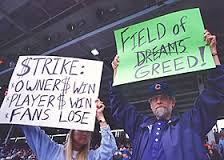
Threatened MLB Players strike.
During the 1980 Memorial Day Weekend a threatened players strike was averted when the late Ray Grebey, the negotiator for the league, made the following offer to the late Marvin Miller and Don Fehr of the players’ association — going forward, every player would automatically qualify for a pension after 43 game days of service, and he’d qualify for health coverage after only one game day.
The problem for all the pre-1980 players was the proposal was never made retroactive.
However, Ronald Dean, an employment benefits attorney who has argued cases before the State Supreme Appellate Court in California, is quoted as saying that “under ERISA it is perfectly permissible to make an amendment retroactive even if it then vests those who were previously unvested.” Even MLB Commissioner Rob Manfred concedes it can be done, but only in collective bargaining.

Atty. Ronald Dean
To date, the MLBPA has been loath to divvy up anymore of the collective pie. Even though Forbes recently reported that the current players’ pension and welfare fund is valued at $2.7 billion, Clark has never commented about these non-vested retirees, many of whom are filing for bankruptcy at advanced ages, having banks foreclose on their homes and are so sickly and poor that they cannot afford adequate health care coverage.
Clark is a widely respected, erudite figure. So it’s a head scratcher why he doesn’t want to go to bat for these men.
‘Cause if he did, he really would be leaving these men something of great significance. And that would be a nice achievement on his part.
Douglas J. Gladstone is the author of two books and multiple newspaper, magazine and webzine stories. He and his family reside in New York.
Related:
http://www.motherjones.com/politics/2013/04/matrix-major-league-baseball-owners-asshole/




